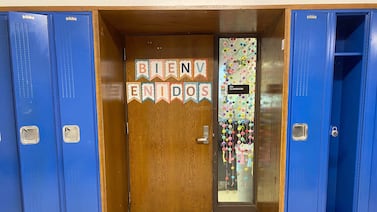The Illinois 2019-20 school report card will exclude statewide assessments that were canceled in the spring due to the coronavirus pandemic, the state Board of Education said Wednesday.
The annual report card, the centerpiece of the state’s accountability system for schools, compiles information on academic performance, educator quality and other metrics for the state, local districts, and individual schools. Schools and districts keep a close eye on the report, since it contains annual ratings for schools. A lower rating can trigger state aid and intervention.
The exclusion of the assessments leaves a big hole in the state data that could undermine Illinois’ painstaking efforts to bring more accountability to schools and could complicate decisions in the future about how tens of millions of dollars in improvement funds are distributed.
The state has said it will carry forward last year’s ratings for the 2020-2021 school year, and campuses targeted for support will continue to receive it.
After a hiatus in July, the board was meeting Wednesday to discuss the impact of the spring school closures on the accountability system.
The Illinois Assessment of Readiness, SAT, Illinois Science Assessment and the Dynamic Learning Maps Alternate Assessment — used for students with severe cognitive disabilities — were all canceled during the spring.
As a result of cancellations, the state’s report card will use three qualifiers to indicate which metrics have been affected by COVID-19-related closures: “no data available,” “calculated with concerns” and “met statewide threshold.” For example, data on gifted students will not be available, as state and local districts were not able to assess students.
During the meeting, board members briefly discussed the possibility of requesting a U.S. Department of Education waiver of testing requirements for 2020-21, since the coronavirus pandemic is unpredictable. But they didn’t reach a decision.
Board member Cristina Pacione-Zayas mentioned that Georgia asked the department for waivers. Illinois State Superintendent Carmen Ayala said that the Education Department said it would not offer any more, but that if there are waivers, the state will pursue them.
However, Ayala said she was concerned about the possible loss of federal funds if the test requirements are waived. “There are millions of dollars in terms of resources in federal grants that could be at stake if we decide to take a position of not giving the assessment,” she said.
Another board member, Donna Leak, asked whether there would be online assessments if remote learning stretches into the spring and disrupts the testing schedule again. Even if a vaccine is available, she noted, it might not be distributed to all students in time, and parents might be concerned about sending students to school buildings. Leak said she was concerned about the possible loss of federal funding for schools if their testing requirements aren’t waived.
“We’ve got some districts that will go bankrupt without those federal dollars,” said Leak.
The state board said it’s exploring the possibility of online assessments in case remote learning is a possibility in the spring.
The state announced new dates for assessments. Current seniors who couldn’t take the SAT in the spring can take the test on Sept. 23 or Oct. 14, with makeup exams on Oct. 27. The IAR, ISA, DLM-AA, PSAT and SAT will be administered during the spring semester.








